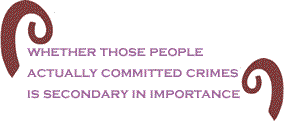
|
|||||||||||||||||||||||

|
|

Custom Search
|
|
 |
|
In Philadelphia, it is time for a new district attorney. The current D.A. Lynne Abraham is retiring, and none too soon - after 18 years in the position, she has been called “America’s deadliest D.A.” for her exceptionally voracious appetite in seeking the death penalty. Without question, most of the people sentenced to death were African American.
Yet, despite the complaints about Abraham over the years, someone voted her back into office, election after election, didn’t they? Seth Williams recently won the Democratic primary for the D.A.’s race, which means he stands a better than good chance of becoming Philadelphia’s next prosecutor in this heavily Democratic city. If he wins, he will have lots of power. But will he use those powers for good? His platform looks promising, including dealing with violent rather than nonviolent crime, employing preventive measures, and most of all, reducing the number of plea bargains. A plea bargain is an agreement in a criminal case where the defendant pleads guilty to a crime - usually to a lesser crime than the original charge - and waives his or her right to a jury trial, and the right against self-incrimination. At its worst, I view plea bargaining as a shortcut to justice, sometimes an injustice in and of itself. A plea bargain is to justice what fast food is to gourmet cooking. Quicker doesn’t necessarily mean better, and 90% of criminal cases end up in plea bargains. It gives the impression that justice is a deal that can be bartered. Perhaps these plea bargains are the grease that helps to lubricate an often frustratingly slow and overburdened justice system. Or perhaps they are the grease that clogs up the arteries of the justice system, and makes that system hardened, calcified, inelastic and diseased - unable to allow justice to flow.
The fact of the matter is that many prosecutors build their careers on the backs of the prosecuted. The number of convictions one racks up become notches in the belt of one’s political career, rungs in the ladder of success. And whether those people actually committed crimes is secondary in importance, if important at all. The American Bar Association (ABA) Rules of Professional Conduct, as well as the Pennsylvania rules, say the following about the role of a prosecutor:
The realities of how some prosecutors behave fly in the face of these sensible rules - rules which assume that the ultimate goal is getting to the truth, rather than the personal aggrandizement of the lawyers and others who oversee the criminal justice system. Consider the town of Tenaha, Texas, where the D.A.
and the police are being sued for, literally, highway
robbery: A federal class-action lawsuit alleges that cops
have been illegally stopping hundreds of mostly out-of-town, Black
and Latino motorists, and giving them the choice of taking a felony
charge, or handing over their money and valuables. A black grandmother
from Akron, Ohio was forced to give up $4,000 after Tenaha police
pulled her over. Meanwhile, an interracial couple from Houston
surrendered over $6,000 to police, who had threatened to take
their children and place
them in foster care. Between 2006 and 2008, the town has seized around
$3 million under this perverse use of Texas’ forfeiture law, which
requires such seized money to be used for law enforcement purposes.
But in Tenaha, proceeds from these illegal seizures went to a
church and a little league baseball team, and one officer received
a $10,000 check. And consider the town of Tulia, Texas (there seems to be a pattern with these Texas towns), where a racially-motivated drug sting led to the arrest of 46 people, nearly all African American, on bogus drug charges. No drugs, money or weapons were seized because no crimes had been committed. Yet, some of these people were sentenced to very hard time, 99 years in one case. Fourteen of the defendants took pleas and were sent to prison. Prosecutors relied on the testimony of a sketchy undercover narcotics agent with a checkered past. The regional, 26-county drug task force that masterminded the sting was allowed to play by its own rules. They received federal money, and were funded based on the number of arrests and convictions they helped win. Such disasters cannot occur without the participation of sheriff's departments, disreputable police officers and unscrupulous district attorney's offices that are looking to make that big score. And society participates in the madness by putting profit into imprisonment, and by endorsing public officials who thrive on a “tough on crime”, “lock ‘em up and throw away the key” stance.
When justice is reduced to a hustle or a deal - not unlike the economic system that the justice system has undergirded for so long - we all become cheapened in the process. And all you have left is a fast food justice system, a McJustice system. BlackCommentator.com Editorial Board member David A. Love, JD is a journalist and human rights advocate based in Philadelphia, and a contributor to the The Progressive Media Project, McClatchy-Tribune News Service, In These Times and Philadelphia Independent Media Center. He blogs at davidalove.com, NewsOne, Daily Kos, and Open Salon. Click here to contact Mr. Love. |
|
Any BlackCommentator.com article may be re-printed so long as it is re-printed in its entirety and full credit given to the author and www.BlackCommentator.com. If the re-print is on the Internet we additionally request a link back to the original piece on our Website. Your comments are always welcome. eMail re-print notice
If you send us an eMail message we may publish all or part of it, unless you tell us it is not for publication. You may also request that we withhold your name. Thank you very much for your readership. |
|
| |
|
| June
4 , 2009 Issue 327 |
|
| Executive Editor: Bill Fletcher, Jr. |
| Managing Editor: Nancy Littlefield |
| Publisher: Peter Gamble |
| Est. April 5, 2002 |
Printer Friendly Version
in resizeable plain
text format or pdf
format. |
| Frequently Asked Questions |
 |

|
 |
 |
 |
| |
| |




























 Perhaps
some plea agreements serve a legitimate purpose. But what happens
when the defendant didn’t commit a crime at all, and is pressured
into taking the deal by his or her defense lawyer or coerced by
the D.A.? What if the crime should not have been prosecuted at
all, such as the case of marijuana possession, or a good kid with
no prior offenses? A criminal record - in most cases secured as
a result of a plea bargain, whether or not the defendant actually
did the crime - can mean prison time, social stigma, and a bar
to many educational and employment opportunities. Prosecutors
have a lot of power, and they have a lot of discretion in deciding
who gets prosecuted and for what offenses. They may choose not
to prosecute a nonviolent, victimless crime, or choose not to
seek punishment that serves no legitimate social purpose. And
as they say, you can indict a ham sandwich.
Perhaps
some plea agreements serve a legitimate purpose. But what happens
when the defendant didn’t commit a crime at all, and is pressured
into taking the deal by his or her defense lawyer or coerced by
the D.A.? What if the crime should not have been prosecuted at
all, such as the case of marijuana possession, or a good kid with
no prior offenses? A criminal record - in most cases secured as
a result of a plea bargain, whether or not the defendant actually
did the crime - can mean prison time, social stigma, and a bar
to many educational and employment opportunities. Prosecutors
have a lot of power, and they have a lot of discretion in deciding
who gets prosecuted and for what offenses. They may choose not
to prosecute a nonviolent, victimless crime, or choose not to
seek punishment that serves no legitimate social purpose. And
as they say, you can indict a ham sandwich. “We
try to enforce the law here,”
“We
try to enforce the law here,”  Two
judges in Luzerne County, PA
Two
judges in Luzerne County, PA






